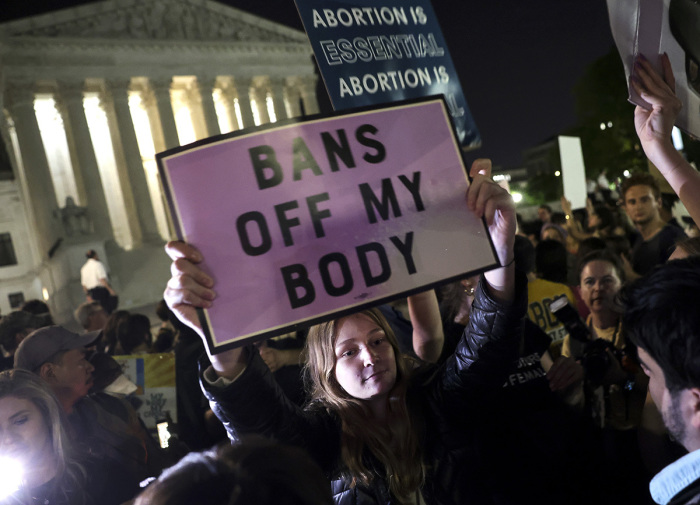Activists to blockade Supreme Court ahead of expected abortion decision

Pro-abortion activists plan to blockade the U.S. Supreme Court as a final decision looms in a case that could reverse the long-standing high court decision that legalized abortion nationwide.
The liberal group ShutDown DC announced this week that it plans to "blockade the streets around the Supreme Court" on June 13, one of the court's decision days, to "rise up for the transformative change that our communities need."
The group cited the early May leak of Justice Samuel Alito's draft decision in Dobbs v. Jackson Women's Health as the motivating factor behind the protest, which it has titled "ShutDown SCOTUS."
In the draft decision, published in Politico on May 2, Alito wrote that the 1973 Roe v. Wade decision that legalized abortion nationwide was "egregiously wrong from the start" and "must be overruled." Four other justices signed onto the draft opinion.
The Dobbs case centers around a 15-week abortion ban in Mississippi. State officials are asking the justices to overturn a lower court ruling striking down the law as unconstitutional.
ShutDown DC warned that the draft decision, which is not final, is "opening the door to the elimination of a myriad of other rights that our communities rely on" and "has brought to the surface something that many of our movements have recognized for a long time." The group argues, "we are in a crisis of democracy."
In the draft opinion, Alito insisted that the "decision concerns the constitutional right to abortion and no other right."
"Nothing in this opinion should be understood to cast doubt on precedents that do not concern abortion," the draft reads.
Reiterating that "our political system is in crisis," ShutDown DC maintained that "times of crisis can either be opportunities to break through the inertia and win transformational change or they can be opportunities for the establishment to further entrench the status quo."
The group hopes that the June 13 protest will provide the opportunity for the "transformational change" it desires.
While the Supreme Court is expected to release decisions on the day of the protest, it remains unclear whether the Dobbs decision will come down that day or at another time during the final month of the Supreme Court's term.
In addition to the Dobbs case, the group's outrage at the Supreme Court stems from dissatisfaction with its current ideological makeup.
"Following decades of organizing by the far right, conservatives now hold a majority on the Supreme Court, and a group of five justices can roll back critical rights and protections that should be settled law," ShutDown DC lamented. "At the same time, the filibuster has left the Senate gridlocked and unable to pass legislation to protect our rights or enact the programs our communities need."
The Supreme Court consists of six justices appointed by Republican presidents and three justices appointed by Democratic presidents. Only five justices signed on to the draft opinion that would overturn Roe.
The Women's Health Protection Act, which would codify the right to an abortion in federal law and limit the ability of states to enact laws restricting abortion, has stalled in the evenly divided Senate after passing the Democrat-controlled House of Representatives on a near party-line vote.
The filibuster requires most legislation to receive 60 votes in the Senate to pass.
Outrage and concernhave led some pro-abortion activists to resort to violence.
Over the past month, multiple churches and pro-life pregnancy centers have been defaced by vandalism, such as pro-abortion graffiti, broken windows and arson.
Shortly after the publication of the draft opinion, the group Ruth Sent Us released the addresses of six Supreme Court justices appointed by Republican presidents and encouraged protests at their homes.
The U.S. Department of Homeland Security has warned that some pro-abortion activists have threatened to burn down the U.S. Supreme Court building and murder Supreme Court justices. The department predicted that threats directed at the justices, politicians, members of the clergy and healthcare providers who are heavily involved in the abortion debate "are likely to persist and may increase leading up to and following the issuing of the Court's official ruling" in Dobbs.
Rachel Carmona, president of the pro-abortion group Women's March, has already signaled that supporters of Roe will unleash a "summer of rage" if the Supreme Court overrules Roe.
If the Supreme Court were to overturn Roe as expected, the legality of abortion would be decided by each state. Twenty-one states would either completely ban or more severely restrict abortions than they do now, 16 states would see no change in their abortion laws as the right to abortion has been codified into law, 10 states will continue to enforce existing abortion restrictions and the three remaining states could allow voters to weigh in on abortion policy at the ballot box in the near future.
Ryan Foley is a reporter for The Christian Post. He can be reached at: [email protected]




























